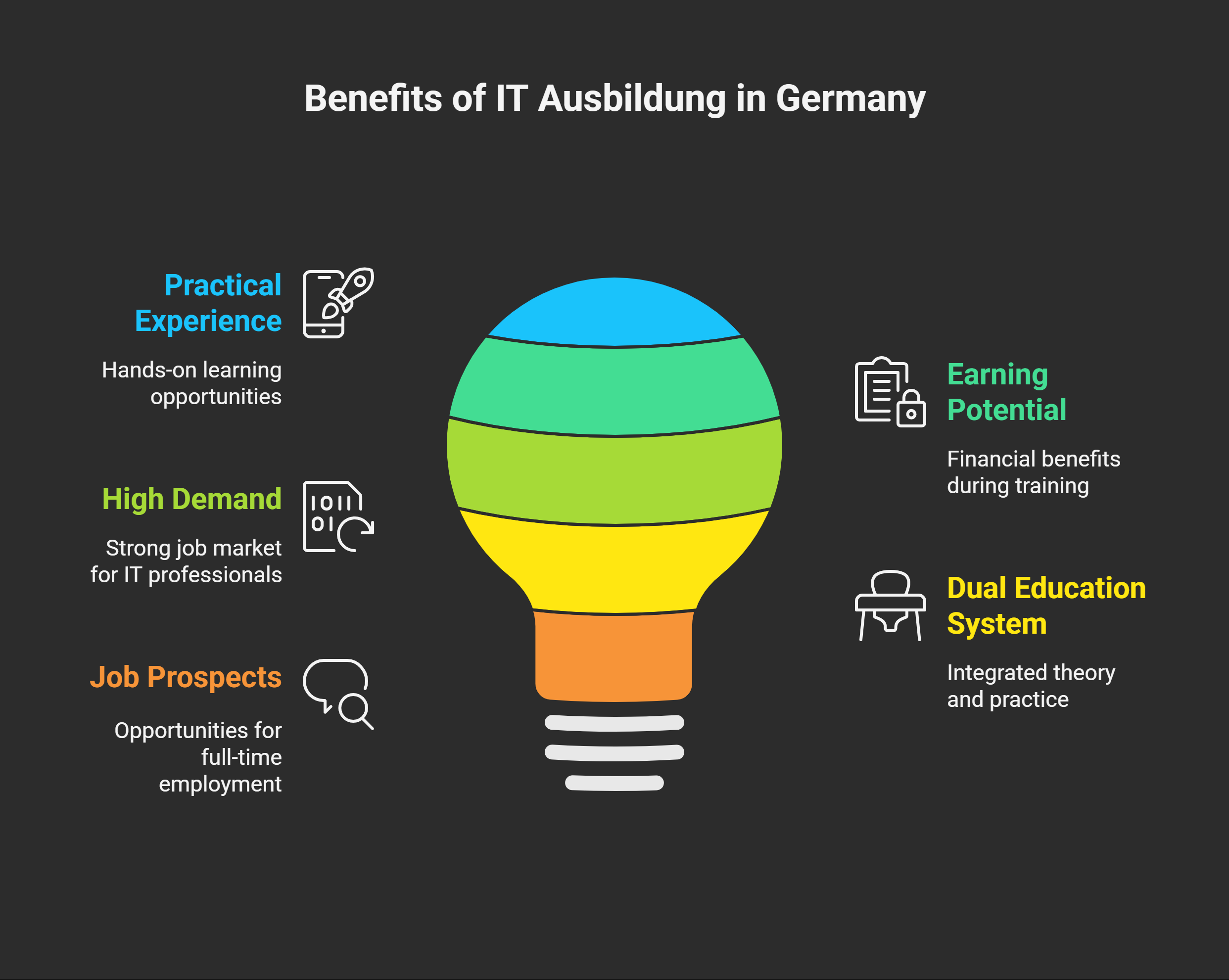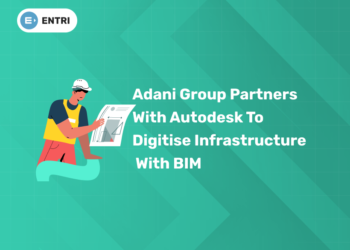Table of Contents
IT Ausbildung in Germany is a great career option. It offers practical learning combined with real work experience. Many students choose this over a full university degree. It helps you learn skills while earning a salary. This program is very popular among international students today. It gives strong career opportunities in the IT sector. Companies value practical experience more than theory-based education.
Key Takeaways
- IT Ausbildung in Germany combines study and work.
- Training programs last two to three years.
- Students earn a monthly stipend during training.
- German language skills are required for most programs.
- Many job roles open after completing training.
- It offers a path to permanent residency in Germany.
- High demand for IT experts makes it valuable.
Master the German Language with Entri App! Click Here for Free Trial Class!
Introduction
IT Ausbildung in Germany is a popular training program. It combines classroom learning with real work experience. Many students prefer it over a regular university course. The program helps students gain practical skills in technology. It also offers a monthly stipend during the training period. Germany is well known for its strong IT industry. The country needs skilled professionals in software and systems.
Why Choose IT Ausbildung in Germany?
- It provides practical experience along with theory.
- Students earn while completing their training period.
- Germany has a strong demand for IT professionals.
- Programs follow the dual education system for better learning.
- Successful trainees often get full-time jobs after completion.
This program is a great choice for international students. It offers skill development, job security, and future opportunities.
What is IT Ausbildung in Germany?
1: How do you say "Good Morning" in German?
IT Ausbildung in Germany is a vocational training program. It focuses on developing practical skills for IT careers. Students learn both in classrooms and at real companies. This system is called the dual education system in Germany. It gives strong practical experience compared to only theory-based courses.
Definition & Overview of Vocational Training in IT
IT Ausbildung is a structured program under German vocational education. It helps students learn job-specific skills step by step. The program combines part-time school with company-based training. Students get hands-on experience while learning essential IT concepts. It usually lasts between two and three years. The goal is to prepare job-ready IT professionals.
Key Features:
- Dual System: Combines theory and practical training.
- Paid Training: Students receive a monthly stipend.
- Specializations: Includes software, networks, and data roles.
- Duration: Typically two to three years in length.
| German A2 Exercises – Download Free PDF | ||
How it Differs from University Education
University education is mostly theory-based and research-oriented. IT Ausbildung focuses on job-specific practical skills instead. Universities offer degrees, while Ausbildung gives a recognized certificate. University courses take longer, usually three to five years. Ausbildung is shorter and includes paid work experience.
Comparison Table: IT Ausbildung vs University Education
| Feature | IT Ausbildung | University Education |
|---|---|---|
| Learning Style | Practical + Theory | Mostly Theory |
| Duration | 2–3 years | 3–5 years |
| Cost | Free or low cost | Tuition fees apply |
| Salary During Study | Yes, monthly stipend | No salary |
| Job Readiness | High after completion | Needs experience after degree |
Free German A1 Mock Tests – Powered by AI!
Test your skills on our interactive platform. Get instant feedback from our AI to help you communicate better and track your progress. Start your free German mock test now.
Test Your German A1 for FreeTypes of IT Ausbildung Programs in Germany
IT Ausbildung programs cover many areas of the IT field. Each program is designed for a specific technology role. Students can select based on skills and career goals. All programs follow the dual education system for balanced learning.
Software Development
The software development program focuses on creating and maintaining applications. Students learn different programming languages and development tools. They gain skills for designing software systems and testing code.
Key Learning Areas:
- Writing clean and efficient code for software.
- Building desktop, web, and mobile applications.
- Testing, debugging, and fixing software errors.
Career Options After Completion:
- Software Developer
- Application Programmer
- Mobile App Developer
Sample Training Topics:
| Area | Details |
|---|---|
| Programming | Java, C#, Python |
| Tools | IDEs, Git, Version Control |
| Testing | Manual and Automated |
System Integration
System integration focuses on connecting hardware and software systems. Students learn how to install and manage networks. They also ensure smooth performance of IT systems.
Key Learning Areas:
- Setting up and configuring IT infrastructure.
- Troubleshooting system and network problems quickly.
- Managing data security and backups.
Career Options After Completion:
- Network Administrator
- System Administrator
- IT Support Technician
Sample Training Topics:
| Area | Details |
|---|---|
| Networking | LAN, WAN, Firewalls |
| Hardware Setup | Servers, Switches |
| Security Basics | Access Controls |
IT Specialist Roles
IT specialist programs cover many IT-related services. Students can focus on different specializations as needed.
Main Specializations:
- IT Security: Protecting systems from cyber threats.
- IT Support: Helping users solve technical issues.
- IT Consulting: Advising companies on best IT solutions.
Career Options After Completion:
- IT Security Specialist
- Technical Support Expert
- IT Consultant
Sample Training Topics:
| Area | Details |
|---|---|
| Cybersecurity | Malware Protection |
| Support Skills | Troubleshooting Tools |
| Consulting | Client Communication |
Data & Digitalization
This program focuses on managing and analyzing data. It also teaches digital transformation strategies for businesses.
Key Learning Areas:
- Storing and organizing large data sets efficiently.
- Using analytics tools for data interpretation.
- Supporting automation and digitalization projects.
Career Options After Completion:
- Data Analyst
- Database Administrator
- Digital Transformation Specialist
Sample Training Topics:
| Area | Details |
|---|---|
| Databases | SQL, NoSQL |
| Analytics Tools | Excel, BI Tools |
| Digitalization | Process Automation |
Duration & Structure of IT Ausbildung in Germany
IT Ausbildung programs are designed for practical and structured learning. They combine classroom lessons with hands-on company training. This dual system ensures students learn both theory and practice.
Duration of IT Ausbildung
The usual duration of an IT Ausbildung program is 2 to 3 years. The exact duration depends on the program type and student performance. Some students finish earlier with strong academic results.
Key Points:
- Standard duration: Two to three years.
- Can be reduced for excellent performance.
- Training starts mostly in August or September.
Structure of IT Ausbildung
The program uses the dual education system. Students split time between vocational school and company training.
Components of the Dual System:
- Vocational School (Berufsschule):
- Classes on IT fundamentals and theory.
- Two days each week or in block sessions.
- Company Training:
- Real work experience in an IT department.
- Three to four days per week in company.
Weekly Schedule Example
| Day | Activity |
|---|---|
| Monday | Company Training |
| Tuesday | Company Training |
| Wednesday | Vocational School |
| Thursday | Company Training |
| Friday | Vocational School |
Exams and Assessment
Students complete intermediate and final exams. Exams include theory and practical projects. Passing both is required for certification.
Requirements for IT Ausbildung in Germany
Starting an IT Ausbildung in Germany requires meeting specific conditions. These requirements cover education, language, age, and visa rules for non-EU citizens. Fulfilling these ensures smooth application and acceptance into a program.
Educational Qualifications
Applicants must have a recognized school qualification. Companies prefer candidates with strong technical understanding.
Accepted Qualifications:
- Hauptschule: Basic secondary school certificate.
- Realschule: Intermediate school certificate, widely accepted.
- Abitur: Advanced qualification, preferred for complex IT roles.
Additional Notes:
- Higher education increases chances of acceptance.
- Some companies test basic math and logic skills.
Language Requirements (German B1/B2)
German language is essential for training and workplace communication. Most programs require at least B1 level proficiency.
Key Points:
- B1 level: Minimum requirement for most companies.
- B2 level: Preferred for better understanding and success.
- Proof required through recognized language certificates.
- Some companies offer language courses before training begins.
Age Restrictions
There is no official age limit for Ausbildung. However, most trainees are between 16 and 30 years old.
Important Details:
- Applicants over 30 can still apply successfully.
- Employers often prefer younger candidates for training roles.
- Motivation and skills matter more than age.
Visa Process for Foreigners
Non-EU citizens need a visa for vocational training. This visa allows living and working in Germany during Ausbildung.
Steps for Visa Process:
- Get an Ausbildung contract from a German company.
- Open a blocked account or show financial proof.
- Get health insurance coverage.
- Submit documents to the German embassy or consulate.
Required Documents:
- Ausbildung contract.
- Proof of language proficiency.
- Proof of financial means (around €11,000 annually).
- Valid passport and biometric photo.
Requirement Summary Table
| Requirement | Details |
|---|---|
| Education | Hauptschule, Realschule, or Abitur |
| Language Level | B1 (minimum), B2 (preferred) |
| Age Limit | No official limit, 16–30 common |
| Visa (Non-EU) | Ausbildung visa with training contract |
Free German A1 Mock Tests – Powered by AI!
Test your skills on our interactive platform. Get instant feedback from our AI to help you communicate better and track your progress. Start your free German mock test now.
Test Your German A1 for FreeSalary During IT Ausbildung in Germany
One of the major benefits of IT Ausbildung is the salary. Trainees receive a monthly stipend during the entire program. The amount depends on the company, region, and year of training.
Average Monthly Salary
The salary increases with each year of training. Larger companies and big cities usually pay higher amounts.
General Salary Range:
- First Year: €900 – €1,100 per month
- Second Year: €1,000 – €1,200 per month
- Third Year: €1,100 – €1,300 per month
Year-Wise Salary Table
| Training Year | Minimum (€) | Maximum (€) |
|---|---|---|
| 1st Year | 900 | 1,100 |
| 2nd Year | 1,000 | 1,200 |
| 3rd Year | 1,100 | 1,300 |
Factors Affecting Salary
Several factors influence the Ausbildung salary in Germany:
1. Company Size
- Large companies pay more than small firms.
- International companies offer higher stipends.
2. Location
- Cities like Munich and Frankfurt offer higher pay.
- Rural areas often pay less due to lower living costs.
3. Industry Demand
- Specializations like IT security may pay more.
- High-demand roles often have better compensation packages.
Additional Benefits During Training
- Free or discounted public transportation tickets.
- Paid holidays as per company rules.
- Health insurance and social security coverage.
Job Opportunities After IT Ausbildung
Completing an IT Ausbildung in Germany opens many career opportunities. Graduates are highly valued because they already have practical experience. Many companies hire trainees as full-time employees after training.
Roles You Can Apply For
IT Ausbildung prepares candidates for different technical positions. Graduates can choose roles based on specialization.
Common Job Roles:
- Software Developer: Builds and maintains software applications.
- System Administrator: Manages IT systems and networks.
- IT Support Specialist: Provides technical help to users.
- Data Analyst: Analyzes and interprets business data.
- IT Security Specialist: Protects systems from cyber threats.
Average Starting Salary: €2,500 – €3,500 per month (gross).
Career Growth in German IT Industry
The German IT sector is growing rapidly. Skilled professionals have high chances of promotions and better salaries.
Growth Path After Ausbildung:
- Start as a Junior IT Specialist.
- Move to Senior Developer or Administrator in 3–5 years.
- Become Team Lead or Project Manager with experience.
- Transition into Consulting or IT Management roles later.
Further Education Options:
- Complete Advanced IT Certifications for better roles.
- Pursue Bachelor’s degree after Ausbildung for higher positions.
Pathways to Permanent Residency
An IT Ausbildung also supports long-term settlement in Germany. Completing training and getting a job allows easier visa conversion.
Steps to Permanent Residency:
- Finish Ausbildung successfully.
- Get a full-time job in IT.
- Apply for an EU Blue Card if eligible.
- Apply for permanent residence after 21–33 months.
Key Advantage: IT jobs are on Germany’s shortage occupation list, making the process easier.
Summary Table – Job Scope After Ausbildung:
| Category | Details |
|---|---|
| Common Roles | Developer, Admin, Support, Analyst |
| Starting Salary | €2,500 – €3,500 per month |
| Growth Options | Senior Roles, Management, Consulting |
| PR Eligibility | After 21–33 months with Blue Card |
How to Apply for IT Ausbildung in Germany
Applying for an IT Ausbildung requires planning and timely preparation. The process includes researching programs, preparing documents, and applying to companies.
Application Timeline
Applications usually open 6–12 months before the program starts. Most Ausbildung programs start in August or September each year.
Recommended Timeline:
- 12 Months Before: Research programs and improve German skills.
- 9 Months Before: Start preparing CV and documents.
- 6 Months Before: Submit applications to multiple companies.
- 3 Months Before: Attend interviews and sign contracts.
Documents Required
Applicants need to submit proper documents in the German format.
Essential Documents:
- CV (Lebenslauf): In German format, well-structured.
- Cover Letter (Anschreiben): Explaining motivation and skills.
- Educational Certificates: School or college transcripts.
- Language Certificate: Proof of German proficiency (B1 or B2).
- Passport Copy: For visa and identity proof.
Steps to Apply
- Find a Training Company: Use official portals like “Ausbildung.de”.
- Prepare German CV and Cover Letter: Follow professional standards.
- Send Applications: Apply to multiple companies for better chances.
- Attend Interviews: Some companies conduct online assessments.
- Sign Training Contract: Required for visa and enrollment.
Tips to Increase Acceptance Chances
- Learn German well: Minimum B1 level, B2 is better.
- Apply Early: Start applications 6–12 months before.
- Highlight Skills: Mention computer knowledge and technical interest.
- Prepare for Interviews: Practice common technical and personal questions.
- Apply to Multiple Companies: Increases chances of getting accepted.
Quick Summary Table:
| Step | Action Needed |
|---|---|
| Timeline | Apply 6–12 months before start date |
| Language Requirement | B1 minimum, B2 preferred |
| Key Documents | CV, Cover Letter, Certificates |
| Contract | Mandatory for visa application |
Advantages of Doing IT Ausbildung in Germany
Choosing IT Ausbildung in Germany offers several benefits for students and professionals. It combines practical learning, income during training, and strong career opportunities.
High Employability
IT Ausbildung graduates are job-ready immediately after completion. Companies prefer candidates with real-world experience gained during training.
Why This Matters:
- Training includes real projects and client work.
- Reduces the gap between learning and working.
- Increases chances of permanent employment after training.
Paid Training
Unlike many study programs, IT Ausbildung provides a salary. Trainees earn a monthly stipend throughout the program.
Benefits of Paid Training:
- Helps cover living expenses during training.
- Offers financial independence for students.
- Salary increases each year of the program.
Strong Demand for IT Specialists
Germany faces a shortage of skilled IT professionals. This demand creates excellent job opportunities after training.
Key Points:
- IT jobs are in the shortage occupation list.
- High demand means better job security.
- Career options include software, networks, and data roles.
Pathway to Permanent Residency
IT Ausbildung can lead to long-term settlement in Germany. Completing the program and getting a job makes the process easier.
Steps for Residency:
- Complete Ausbildung successfully.
- Secure a full-time IT position.
- Apply for EU Blue Card or PR after experience.
Additional Advantages
- Training combines theory and practical knowledge.
- Recognized qualification across Germany and EU.
- Chance to build a strong professional network.
Master the German Language with Entri App! Click Here for Free Trial Class!
Challenges & Things to Keep in Mind
While IT Ausbildung in Germany offers many benefits, there are challenges. Understanding these helps students prepare better and succeed in the program.
Language Barrier
German is essential for training and workplace communication. Many international students face difficulty if language skills are weak.
Key Points:
- Minimum requirement is B1 level, B2 is preferred.
- Technical terms in German can be hard to understand.
- Some companies offer language courses before training.
Competitive Admission
IT Ausbildung positions attract many applicants every year. This creates strong competition for limited spots.
Why This Happens:
- Paid training attracts international students.
- Companies choose candidates with strong German and technical skills.
- Applying early increases chances of selection.
Cost of Living
Although Ausbildung offers a salary, living costs can be high. This is especially true in large cities like Munich or Frankfurt.
Tips to Manage Costs:
- Choose affordable cities or smaller towns.
- Share apartments to reduce rent expenses.
- Plan a monthly budget carefully.
Cultural Adjustment
International students may face cultural differences. Adapting to German work culture takes time.
Important Notes:
- Punctuality is very important in Germany.
- Communication style is formal and direct.
- Learning workplace etiquette helps in better integration.
Balancing Work and Study
The dual system requires good time management. Students must handle both company work and school learning.
Advice:
- Plan schedules and assignments carefully.
- Use weekends for revision and practice.
- Seek help from mentors if needed.
| Goethe 2025 Exam Dates: Multiple Test Centers | |
| Trivandrum Goethe Exam Dates | Kochi Goethe Exam Dates |
| Chennai Goethe Exam Dates | Coimbatore Goethe Exam Dates |
Conclusion
IT Ausbildung in Germany is a great choice for IT careers. It combines theory and practical learning through the dual system. Students gain experience while earning a monthly salary. Many roles open after completing the program successfully. It also offers a pathway to permanent residency later. Strong demand for IT specialists ensures good job security. This program is ideal for both local and foreign students.
Germany values skilled professionals in every technology-driven industry today. IT Ausbildung provides knowledge and experience for future growth. It helps students start a stable career quickly and effectively. Language skills and preparation improve the chances of success. International students should plan early for visa and documents. Choosing the right specialization boosts long-term career opportunities. IT Ausbildung in Germany can truly change your future.
Free German A1 Mock Tests – Powered by AI!
Test your skills on our interactive platform. Get instant feedback from our AI to help you communicate better and track your progress. Start your free German mock test now.
Test Your German A1 for FreeFrequently Asked Questions
1. What is IT Ausbildung in Germany?
IT Ausbildung in Germany is a vocational training program for IT careers. It follows the dual education system, combining classroom learning with practical work in a company. Students spend part of the week in vocational school and the rest in real workplace training. The program usually lasts two to three years and covers various IT specializations like software development, system integration, and data management. Graduates receive a recognized qualification and often get job offers immediately after completion.
2. How is IT Ausbildung different from a university degree?
University degrees focus more on theoretical knowledge and research. In contrast, IT Ausbildung emphasizes hands-on training in real companies along with classroom lessons. Ausbildung students earn a salary during training, while university students usually pay tuition. The program is shorter, typically two to three years compared to a four-year degree. IT Ausbildung graduates are job-ready immediately, while degree holders may need internships or practical experience after graduation. Both options are good, but Ausbildung suits those who prefer practical learning.
3. What are the basic requirements for IT Ausbildung?
Applicants need at least a secondary school certificate like Hauptschule or Realschule. Some companies prefer Abitur or equivalent higher qualifications for complex programs. German language proficiency at B1 or B2 level is essential because most training and communication are in German. Non-EU students also need an Ausbildung visa, which requires an offer letter from a company, proof of financial resources, and health insurance. There is no strict age limit, but most trainees are between 16 and 30 years old.
4. How much salary do trainees get during IT Ausbildung?
Trainees receive a monthly stipend that increases every year. In the first year, the average salary ranges between €900 and €1,100. In the second year, it usually increases to €1,000–€1,200, and in the third year, it can reach €1,100–€1,300. The amount depends on the company, location, and specialization. Larger companies and big cities like Munich or Frankfurt generally pay higher stipends. This income helps cover living costs, although additional planning is necessary for expensive cities.
5. Can foreigners apply for IT Ausbildung in Germany?
Yes, foreigners can apply for IT Ausbildung, but they need a visa for vocational training. To get this visa, applicants must have a signed Ausbildung contract from a German company. They also need proof of financial stability, usually through a blocked account or sponsor, and valid health insurance. Language proficiency is very important, as most companies require B1 or B2 German level. The process can take several months, so applicants should start preparing early and apply to multiple companies.
6. What job opportunities are available after IT Ausbildung?
Graduates can work in several roles such as software developer, system administrator, IT support specialist, data analyst, or IT security expert. Many companies offer permanent positions to their trainees after successful completion. The German IT industry is growing fast, which means high demand for skilled professionals. Graduates can also pursue further education or certifications to move into senior roles or management. Long-term, these roles can lead to high salaries and stable careers in Germany.
7. Is it possible to get permanent residency after Ausbildung?
Yes, IT Ausbildung is an excellent pathway to permanent residency. After completing the program and getting a full-time IT job, candidates can apply for a work permit or an EU Blue Card if they meet salary requirements. With an EU Blue Card, permanent residency can be obtained after 21 to 33 months, depending on language skills. Since IT jobs are on Germany’s shortage occupation list, the process is faster and easier for Ausbildung graduates.
8. How can I increase my chances of getting selected?
Start by improving your German language skills to at least B1 level. Prepare a German-format CV and a strong cover letter highlighting your interest in technology. Apply early, ideally 6–12 months before the start date, and send applications to multiple companies. Practice for interviews and basic IT tests, as some companies conduct assessments. Showing motivation, basic technical knowledge, and good communication skills can make you stand out from other applicants.
9. What are the challenges of doing IT Ausbildung?
The biggest challenge is the language barrier because most training is in German. Another challenge is managing living expenses, especially in big cities with higher costs. The application process can be competitive, so early preparation is important. Cultural adaptation may also take time, as German work culture values punctuality and precision. Balancing vocational school and company work can be demanding, so time management skills are essential for success.
10. Can I do IT Ausbildung without knowing German?
It is very difficult to start IT Ausbildung without German knowledge. Most companies require at least B1 level proficiency because communication and training happen in German. Some international companies or programs may offer support or language courses before starting. However, for better success and understanding, learning German before applying is highly recommended. Strong language skills not only help in training but also in passing exams and securing permanent jobs later.













